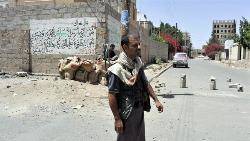A UN-brokered peace deal between Houthi rebels and Yemen's government has been signed while the Houthis have taken control of government buildings and a state radio and TV station in the capital, Sanaa.
Sunday's agreement calls for the current government to rule in a caretaker role until a new administration is formed next month after consultations with all political parties.
Yemen's President Abdrabuh Mansour Hadi urged all sides to abide by the deal.
Journalist Peter Salisbury said the agreement aimed to get the Houthis to leave the capital. However a section which was not signed by the Houthis stipulated that they were to withdraw from Sanaa, Jawf and Amran within 45 days.
"The fighting didn't stop because of the deal, but because the Houthis had achieved their military aims in Sanaa."
He said clashes were ongoing in other parts of the country, including Maarib to east of the capital.
On Sunday the rebels took over government buildings in the capital including the defense ministry, the army headquarters, the parliament building, the central bank and the national radio station.
Al Jazeera's Mohamed Vall, reporting from Sanaa, said that most were taken over without fighting, which he referred to as a "capitulation of sorts" by the army.
He added that soldiers from the army had been seen changing into civilian clothes to avoid being "arrested by the Houthis".
PM resigns
Journalist Iona Craig , also in Sanaa, reported later in the day that fighting had stopped while politicians gathered in southern Sanaa.
"Some people are claiming this is a coup, and others are saying [Houthis] have legitimate demands ... but they have gone further than anybody really anticipated. They are Yemen's strongest fighting force and they've beaten the army several times.
"They've said this afternoon that they want to try to protect government buildings within the city, which to many people would seem like a coup attempt."
Earlier on Sunday, Mohammed Salem Basindwa tendered his resignation as prime minister and criticized the president's performance in this crisis and for not participating fully in the national dialogue process.
Curfew in place
On Saturday, the state TV headquarters in Sanaa was captured by the Shia rebels after coming under heavy shelling, while the country's Supreme Security Commission, chaired by the president, ordered a curfew in four areas north and west of the capital between 9pm and 6am.
More than 100 people have died in fighting since Thursday, sparked by weeks of protests and clashes. It also prompted the suspension of international flights to Sanaa and the interruption of broadcasts by state television.
Thousands of Houthis have staged more than a month of protests in Sanaa, besieging ministries and blocking the road to the main airport.
The Houthis are a Zaidi Shia group whose traditional power base is in the north. Their leaders want a new government and more political power.
The government's plans for a six-region federation has been rejected by the Houthis and the southern separatists.
PHOTO CAPTION
Armed Yemeni supporters of the Shiite Houthi movement guard a street during a gunfight between Yemeni army troops and Shiite Houthi fighters in Sana'a, Yemen, 20 September 2014.
Al-Jazeera


 Home
Home Discover Islam
Discover Islam Quran Recitations
Quran Recitations Lectures
Lectures
 Fatwa
Fatwa Articles
Articles Fiqh
Fiqh E-Books
E-Books Boys & Girls
Boys & Girls  Women
Women










